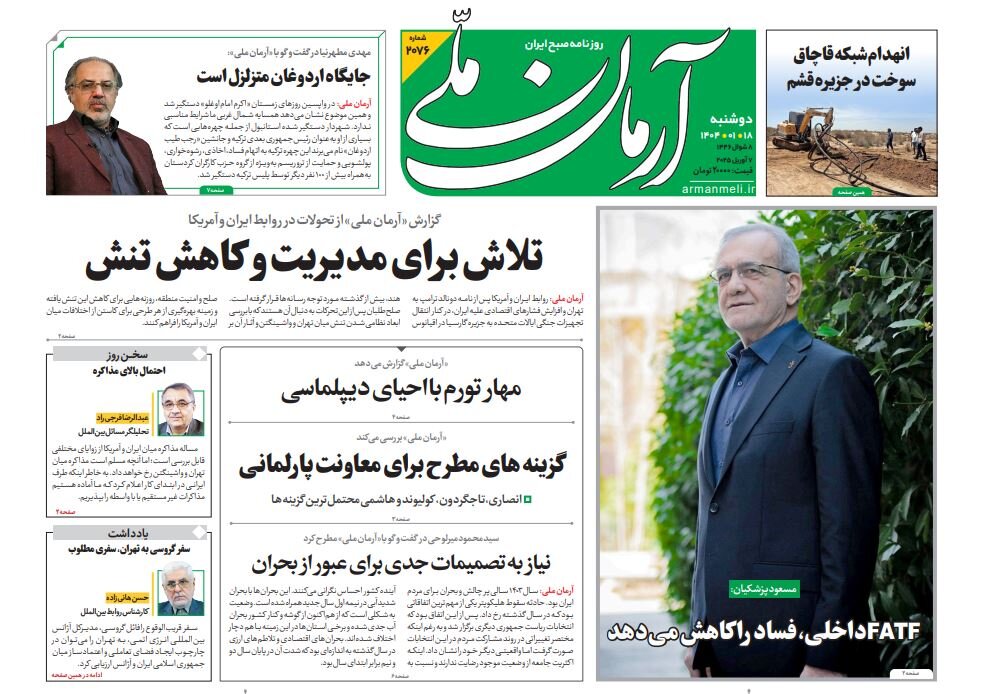Tehran – In his commentary, Ahman Emery discussed Trump’s various moves and claims against Iran, writing: Political analysts believe that Trump’s main goal is to revive the policy of maximum pressure on Iran.
Trump even believes he is trying to implement a “Libyan model” on Iran’s nuclear program. Iran’s nuclear program is a model in which other parties must abandon all nuclear activities. For this reason, Trump has effectively called for the closure of Iran’s nuclear facilities, not a real negotiation. However, such demands are not accepted by Iran in any way. Tehran previously emphasized that uranium enrichment capabilities were a red line of negotiations and that they did not want to give up under any circumstances. But Trump and some of his regional allies, including Israel, are aiming to reduce Iran’s resistance in the region and bring it to the table of negotiations unilaterally through a combination of economic and security pressures. In this regard, Trump has taken steps to impose broader sanctions on Iran. He is trying to block Iran’s oil exports entirely by intensifying sanctions on Iran’s oil industry, as well as threatening Chinese companies that buy Iran’s oil.
Jam-e-Jam: Psychological Wars against Iran in Western Media
In an interview with Dr. Hamid Reza Asefi, a former spokesman for the Ministry of Foreign Affairs, Jammu examined the axis of the psychological war with Iran. He said: The purpose of the axis of psychological warfare is to inspire the idea that the Islamic republic of Iran has been weakened, especially after the development of the machinations of Syrian and Hezbollah leaders and many Hamas officials. Actions taken to demonstrate the decline of Iranian influence and authority in the region. At the same time, the United States was trying to target the historical memories of Iranian people and prevent them from comparing the current situation with the past. Whether we like it or not, the US has been somewhat successful in these two areas by using a variety of media. However, the main goal of this psychological operation is to create confusion and polarization, strengthen economic problems and pressure, and thus create anxiety to weaken the Islamic Republic because of such actions in the past.
Iran: Iran has the right to negotiate indirectly
In the memo, Iranian newspapers cite the reasons why Iran is distrustful of the United States. And it is because of this lack of trust that Tehran refused to negotiate directly with Washington. It writes as follows: The fact is that the US foreign policy towards Iran over the past 80 years has always been focused on pursuing American interests and ignoring the national interests of Iranians. Given the bad US records regarding Iran, the Islamic Republic should be given the right to take a pessimistic view of a new round of possible negotiations, and to pursue an indirect path of negotiation as it has proven unreliable. In recent years, after months/year negotiations on Iran’s nuclear issue, they turned their backs on the JCPOA, with the White House presidential change. They waste months of intensive diplomatic efforts by six world powers and the Islamic Republic of Iran. However, Iran has not yet closed its path to diplomacy and is preparing a situation of “indirect” negotiations. Their goodwill must be proven through indirect negotiations, and Iran will take further action. However, threats lead to anti-threats.
Farhikhtegan: Celebrities joining the opposition are isolated
Farhikhtegan analyzed the isolation of celebrities who joined the opposition. It said: celebrities who left Iran and joined the opposition now acknowledge their isolation. This admission shows the bitter reality of life after joining the opposition. It also reflects changes in the financial and media structure that once supported managers of these media outlets. The reduction in financial aid, exacerbated by political developments such as Trump’s rise in power, and the presence of the decline of these individuals in the media space due to changes in media algorithms and the failure of disruption projects, has forced them to look back at their obstacles. At the 2022 event (following Masha Amini Death), the platform supported opposition content and helped supporters increase the audience and voice they were listening to. But over time, this changed, especially after the failure of the sabotage project. This segregation is not only a result of reduced financial support, but also a shift in the media paradigm that no longer views these individuals as influential voices.

